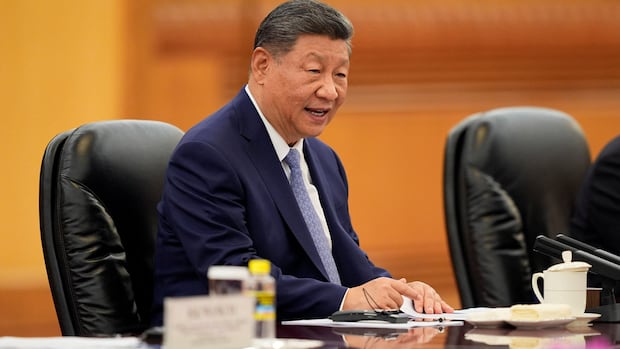Prime Minister Mark Carney says he’s hoping to reset expectations in Canada’s relationship with China when he meets President Xi Jinping this week at the Asia-Pacific Economic Cooperation (APEC) summit in South Korea.
The meeting will be the first between the leaders of both nations since diplomatic relations went into a deep freeze following the 2018 arrest of Huawei executive Meng Wanzhou after an extradition request from the United States. Beijing responded by locking up two Canadians — Michael Kovrig and Michael Spavor.
Carney confirmed the meeting while talking to reporters at the end of the ASEAN summit in Kuala Lumpur, Malaysia.
“It’s the start of a broader discussion,” Carney said, referencing his recent meeting at the UN General Assembly with Chinese Premier Li Qiang.
Carney said the meetings cover “a broad range of issues,” including “the commercial relationship, as well as the evolution of the global system.
“So I look forward to the meeting with the president,” Carney said.
U.S. President Donald Trump is hoping to meet with Xi after the two countries announced this week that they’ve put in place a framework for a possible trade deal.
For his part, Carney didn’t rule out easing investment restrictions placed on Chinese capital by the previous Liberal government under former prime minister Justin Trudeau.
He also left the door open to negotiating a free trade deal with the hardline communist government or lifting tariffs on Chinese electric vehicles that Canada imposed in 2024 at the same time as the United States.
“Relationships rebuild over time when they have been … when they have changed, when they’ve changed for the worse. And so we have a lot of areas on which we can build,” Carney said.
He noted that China is Canada’s second-largest trading partner, the second-largest economy in the world and one of the most influential nations on the world stage.
The last official meeting between a Canadian prime minister and Xi was in 2017, when the Trudeau government failed to reach a trade agreement with China.
Not long after, the relationship soured with the arrest of Meng, the Chinese tech executive, and the detention of Kovrig and Spavor.
More recently Beijing retaliated with sanctions after Ottawa imposed a 100 per cent tariff on Chinese electric vehicles and a 25 per cent levy on steel and aluminum from China.
In August, China imposed a 75.8 per cent duty on Canadian canola seed, hurting farmers in Alberta, Saskatchewan and Manitoba.
Carney said relations are starting from a low point and there’s room for substantial improvement.


